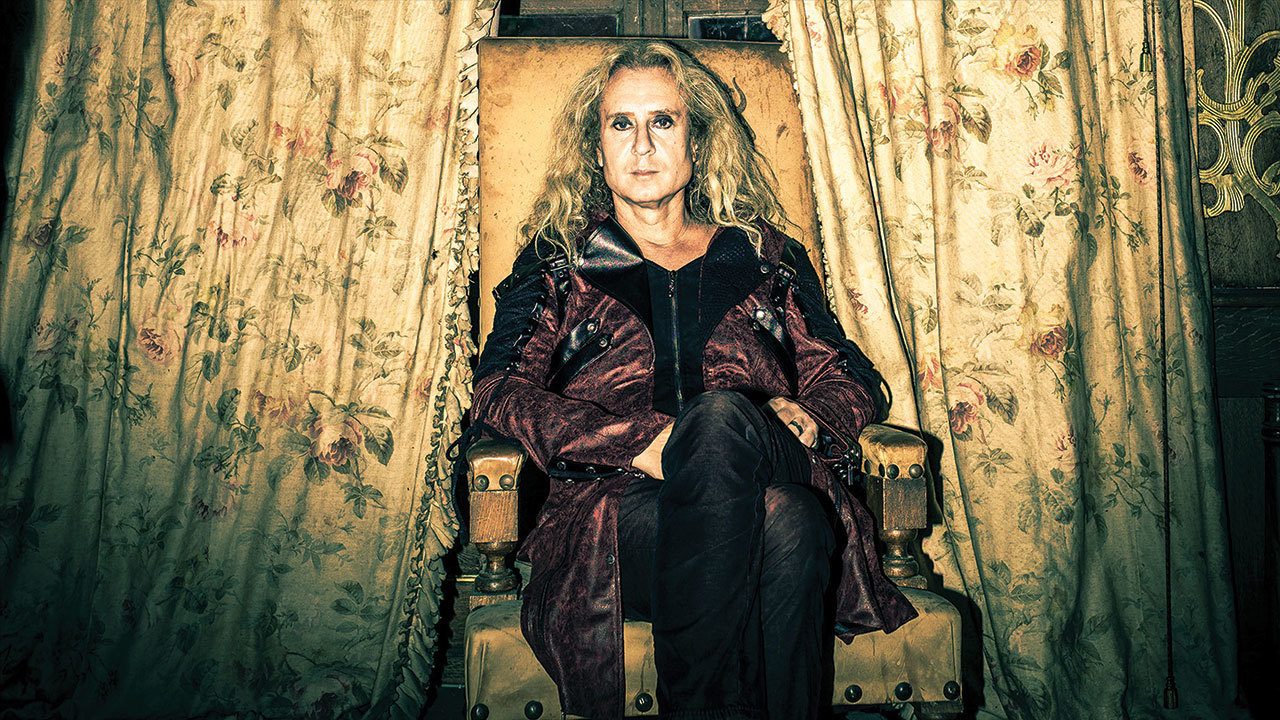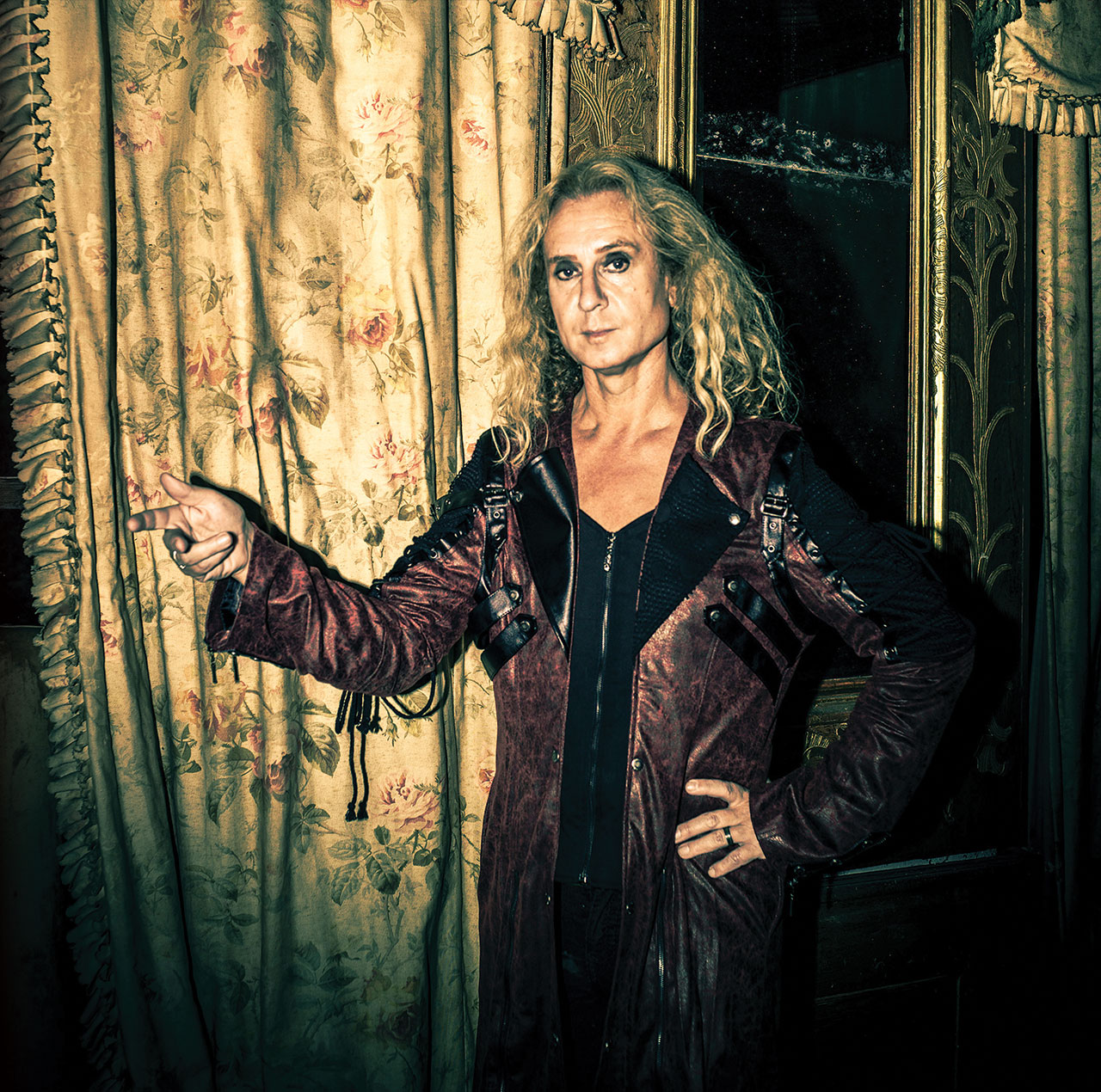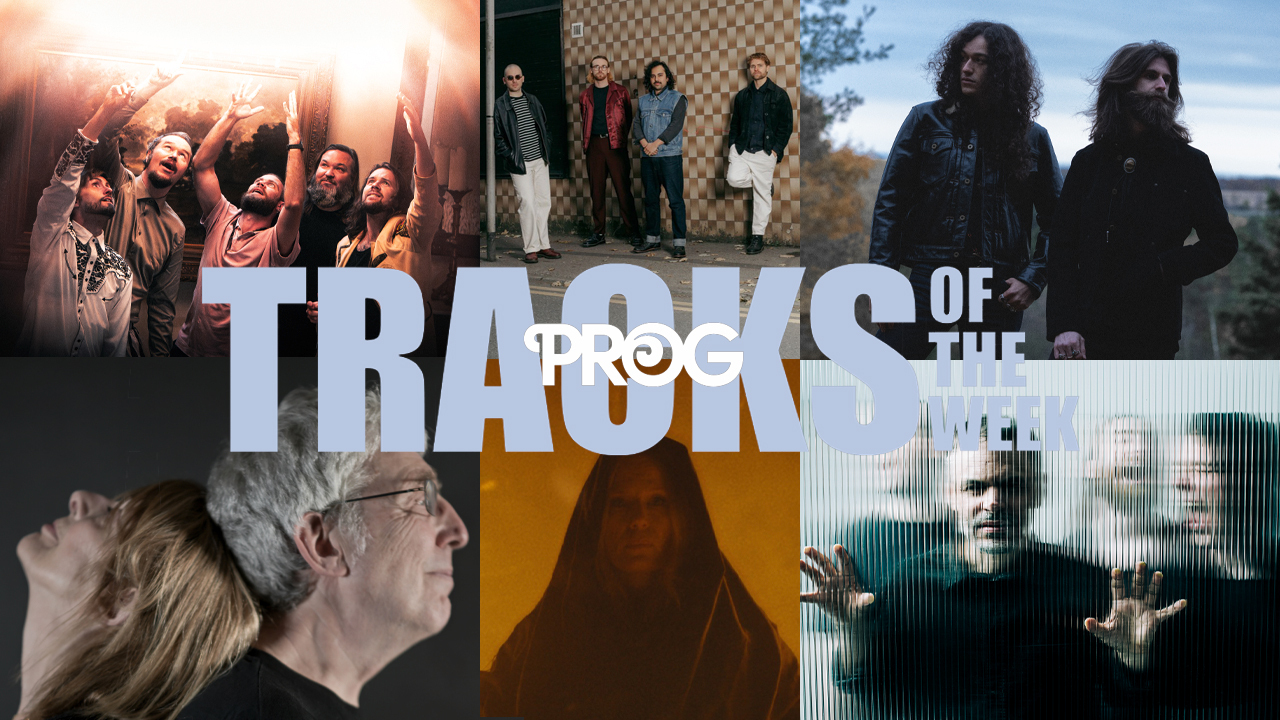Getting to know Nad Sylvan, one of prog's most intriguing characters
He’s the theatrical singer who’s worked with plenty of prog royalty. Now Nad Sylvan is back with his second solo album proper, continuing the Gothic concept of the first

Select the newsletters you’d like to receive. Then, add your email to sign up.
You are now subscribed
Your newsletter sign-up was successful
Want to add more newsletters?

Every Friday
Louder
Louder’s weekly newsletter is jam-packed with the team’s personal highlights from the last seven days, including features, breaking news, reviews and tons of juicy exclusives from the world of alternative music.

Every Friday
Classic Rock
The Classic Rock newsletter is an essential read for the discerning rock fan. Every week we bring you the news, reviews and the very best features and interviews from our extensive archive. Written by rock fans for rock fans.

Every Friday
Metal Hammer
For the last four decades Metal Hammer has been the world’s greatest metal magazine. Created by metalheads for metalheads, ‘Hammer takes you behind the scenes, closer to the action, and nearer to the bands that you love the most.

Every Friday
Prog
The Prog newsletter brings you the very best of Prog Magazine and our website, every Friday. We'll deliver you the very latest news from the Prog universe, informative features and archive material from Prog’s impressive vault.
“Do I feel Swedish?” ponders Nad Sylvan, sniffing back a cold and hoping it gets better quickly so his voice can adorn the Steve Hackett show in Dublin later that night. “I actually feel more like a person from everywhere – a ‘world citizen’, if that’s not a cliché. And I don’t just mean because of all the touring with Steve.
“I always felt apart from typical Swedish culture,” he reveals. “Growing up in Malmö in the 60s, in a very rough, working-class area, I wasn’t like the others at all. When I was very young I was bullied. I went through hell because I already stood out. I refused to do what everyone else did.
“Even when I was little, I wouldn’t dress the same. I’d play with the girls because I was quite sensitive, even frail. I could feel things. I had intuition, the artist’s spirit. So I guess eventually I developed an image which was how I’d like to see myself.
“When I go to a show, I want to be entertained, I want to see somebody doing something onstage. If you look at Bowie, Alice Cooper, Peter Gabriel, Michael Jackson, Prince – they were all eccentric, they all went over the top. I’m not putting myself on their level, but they wouldn’t have been as successful if they hadn’t been confident enough to try something other than T-shirt and jeans. I need something to work with!”
Sylvan, who has channelled such feelings into becoming a consummate vocalist and flamboyant showman, has plenty to work with right now. As well as being a vital part of Steve Hackett’s revisitations of Genesis, where he sings the old Gabriel and/or Collins numbers, he’s just released his second solo album proper. The Bride Said No is a powerful follow-up to 2015’s Courting The Widow, wherein he succeeded in evoking the melancholy and majesty of peak Genesis while transcending his influences and avoiding any copyism to create one of the finest prog albums of recent years. The 22-minute, seven-part centrepiece To Turn The Other Side is a showstopper.
This time he’s taken the plot onwards, with music that mixes in flavours from other genres while retaining an elusive, timeless alchemy. Steve Hackett, Guthrie Govan and Roine Stolt guest on guitar, while Tony Levin and three female vocalists also appear. The concept tale of the previous album is extended too. “You need to make a big statement,” he says. “Why linger in a safety zone? You have to expand.”
He’s proven the wisdom and courage of this over the course of a lengthy climb to his currently thriving musical career. After decades of frustration and relative obscurity, his voice came to the attention of Hackett thanks to his work as a member of Unifaun (their name taken from the lyrics of Genesis’ Dancing With The Moonlit Knight), and then with fellow Swede Stolt and other Flower Kings in Agents Of Mercy. He also sang on last year’s Anderson/Stolt album Invention Of Knowledge. Now in his mid-50s, he’s happy to at last have given up his day job. Day job? One tries to picture the splendidly dandyish, foppish Sylvan fitting into the everyday working world.
Sign up below to get the latest from Prog, plus exclusive special offers, direct to your inbox!
“Actually it was a night job, not a day job,” he laughs. “At a surveillance centre, all alone at a switchboard answering calls, with just two giant computers for company. It wore me out, because I was making music all day, then going to that all night. But they were gracious when I finally left. They knew I’d endured, and it’d taken many years of persistence for my musical hopes to come to fruition.
“You don’t choose music – it chooses you, it comes to you. It’s in your DNA. Success is just a matter of luck – there’s only so much you can do about that – but the music itself is how you express yourself, your identity.”
So what is “the bride” saying this time, apart from “no”? Sylvan didn’t originally intend to paint a second chapter of the somewhat Victorian Gothic concept begun on Courting The Widow, but when he revisited a song he’d penned long ago, which evolved into the title track, he saw thematic links forming.
“My character the Vampirate enters fresh waters in his world, so I’ve brought him into present times. Which makes for an analogy with the music, where I feel the rhythms are more contemporary and it’s heavier in parts, more rocking. I even hear elements of classic R&B too, because in my past I was a soul singer. And you even have me using the phrase ‘You go, girl!’ which is a very modern attitude.
“You see, there’s more to me than sounding like Collins and Gabriel! Although obviously that – the work with Steve – is a great springboard. But I feel confident I’m not about pastiche. To me there’s more I can do and my heart is honest. My music is theatrical, dramatic, but it’s also a diary.”

This album, however, sends us out to sea again with some shady characters, so we’ll assume the ‘diary’ part is allegorical.
“Ah yes. The ship is a vessel for music. The Vampirate is joined by the Quartermaster, who’s an alcoholic and a royal bastard. And the widow who wouldn’t marry him wants revenge. Almost every song was written or co-written last year within six months, so it’s quite coherent really. There’s anxiety, mystery, a lot of feelings…”
While there is indeed much variety on the album – without it sacrificing its sense of grandeur – the track What Have You Done features not one but two epic prog guitar solos to bring the house down, courtesy of Misters Hackett and Govan. This came about by accident, Sylvan says, and could even at one point have involved Andy Latimer of Camel.
“I got to know Andy while touring Japan with Steve. We hit it off, but he’s not known for guesting. This I didn’t know at the time, so I asked him. I could well imagine him on this track – he has that warm sound and style. So it was agreed, but then unfortunately Andy was ill when the time came. I thought, ‘Oh Christ, what shall I do now?’ I didn’t think Steve had time, so I begged Guthrie. Then Steve did come in to play some stuff, so I asked him to do it just in case Guthrie got busy. Of course, then it turned out they both delivered on the same day! As both solos were so amazing, the best and only right solution was to let the two complement each other and go completely over the top. It just takes off and flies, doesn’t it?”
Flying is also evoked in the video for new track When The Music Dies, wherein Sylvan wears a pair of angel wings. He speaks of this rhythmic, intense number, with Tony Levin on distorted Chapman Stick, as having crossover potential, and declares it a tribute “to all the greats we lost in the last year”.
The White Crown, meanwhile, is “where your very own prog Vampirate goes crazy. I think there’s so much going on in there. I’m not abandoning my progressive instincts but it’s bringing in funk and even a Broadway musical theatre side…”
As Sylvan’s own career continues to ascend, he’s grateful he persevered – for decades, not years – when things weren’t happening for him. “Music came to me when I was young and if I’d given up, I’d have felt I had nowhere to go. I’m not the only one, of course. A lot of very talented people never get heard. I guess I learned to hone things… I even look at early clips on YouTube of me performing with Steve and I can see why some people found me annoying! I was still looking for a way to do my thing. Yes, I like theatricality, but I learned that sometimes if you stay still, it can have a bigger impact. Your eyes, a hand gesture – do it once or twice, but not all the time.
“I mean, technology can sometimes take control of us too much, like when everyone’s on their phones instead of living in the now, and that’s a bit sad, but it’s where we are. But it’s been very useful to me too, so I’ve had my learning periods and I’ve grown.”
One thing Sylvan learned a while back was his stage name. He was never 100 per cent certain until one day he just blurted it out. It’s been through a few changes. Born Hugh Stewart in California, his parents moved back to Sweden the same year. When they divorced, his mother changed his name to Christopher. He was Christopher Grabner when she remarried, but he didn’t feel any of these monikers was a good fit. He fronted a succession of struggling bands in Sweden (some less struggling than others: with One By One he once supported Lionel Richie in front of 12,000 people but got so drunk on whisky that it was a disaster), yet thought his name “sounded boring, like a golf player”. So, impressed by Alice Cooper and Marilyn Manson, he landed on Nadine Sylvan.
When an A&R man in London asked him his name as he pitched an album he’d made on which female voices shared the mic with him, he spontaneously said “Nad” instead of “Nadine”, in case the guy got confused as to who was the lead singer.
Eventually, after spinning between genres, he embraced that lifelong love of Genesis and threw himself into Unifaun and Agents Of Mercy. He now feels that Unifaun’s 2008 album is “a cult album that’s getting late recognition thanks to the internet”, telling us it will be reissued soon. Agents Of Mercy “went under the radar a little, somehow, but made some very decent music”. And then Hackett came calling.
“A woman’s name just seemed, again, over the top, but I was getting desperate. A friend encouraged me, saying, ‘Be outrageous. Be the class clown if you need to be. You have the musical skill. Just make them notice it.’”
And Sylvan – that’s a word which relates to the woods, or something that inhabits them. Is it true you live in a forest?
“Yes,” he affirms. “I’ve lived for the last 10 years by a lake in the forest, 30 kilometres outside Stockholm. I’m very happy there. The big city’s not for me. It’s very picturesque there and I’m up on a hill, overlooking the lake. The nearest neighbours are a short walk away.
“When I’m not on the road with Steve and the band, I go there and just… exhale. After striving for so many years, through so many setbacks, then to have made my own albums that I’m proud of – it’s good to just go back there and breathe out and be grateful. To leave all the tensions behind.”
Not that he plans to rest for too long. He’d love to make a third album in the vein of Courting The Widow and The Bride Said No, and envisions the whole project as a trilogy.
“Firstly, I’m always available to Steve whenever he needs me, and it looks like we have plenty of dates ahead into next year. I’m so grateful the band have accepted me as a part of it, whereas before I was a guest. But as and when I find time, my goal is absolutely that this will form a trilogy, in terms of the music, the themes. If the first was the past and this one’s brought the characters into the present, then the next will move them into the future.
“I don’t worry about my age now,” Sylvan adds. “Rock has changed its perspective… people age but the music refuses to die. It’s never too late. It’s a way of life.”
Nad Sylvan is still standing out and striding forwards. It’s a Nad world.
The Bride Said No is out now on InsideOut. See www.nadsylvan.com for more information.
Chris Roberts has written about music, films, and art for innumerable outlets. His new book The Velvet Underground is out April 4. He has also published books on Lou Reed, Elton John, the Gothic arts, Talk Talk, Kate Moss, Scarlett Johansson, Abba, Tom Jones and others. Among his interviewees over the years have been David Bowie, Iggy Pop, Patti Smith, Debbie Harry, Bryan Ferry, Al Green, Tom Waits & Lou Reed. Born in North Wales, he lives in London.

